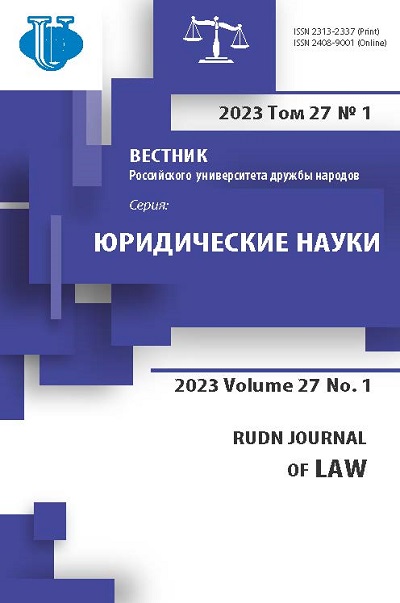Russian Constitutional Court jurisprudence of tax fairness
- Authors: Ryabova E.V.1
-
Affiliations:
- Lomonosov Moscow State University
- Issue: Vol 27, No 1 (2023)
- Pages: 54-75
- Section: CONSTITUTIONAL AND MUNICIPAL LAW
- URL: https://journals.rudn.ru/law/article/view/34057
- DOI: https://doi.org/10.22363/2313-2337-2023-27-1-54-75
- ID: 34057
Cite item
Abstract
Public finance is subject to the principle of fairness, which has a vague character and rarely finds an appropriate reflection in law. Supreme Courts and Constitutional Courts of different countries may refer to this principle and disclose the content of fairness in public finance processes. The scope of the article includes legal establishment and realization of the principle of fairness in contemporary Russian tax law. The author investigates this issue mainly considering the Constitutional Court’s legal positions. The Russian Constitutional Court actively refers to the principle of fairness to resolve disputes in taxation. The analysis of Constitutional Court judgements shows that the content of the principle of fairness for tax purposes depends upon a type of public fee. In some cases, the Court uses the principle of fairness in a broader legal meaning and does not interpret fairness for tax purposes using the vaguest terms and words for arguments. In other cases, the Court may use a more specific and narrow meaning of the principle of fairness in cases on imposition of tax and/or tax liability (tax fairness).
Keywords
About the authors
Elena V. Ryabova
Lomonosov Moscow State University
Author for correspondence.
Email: lentaf@mail.ru
ORCID iD: 0000-0002-4065-9630
Candidate of Legal Sciences, Associate Professor at Department of State and Municipal Finance
1 build. 13 Leninskie Gory, Moscow, 119992, Russian FederationReferences
- Alesina, A. & Angeletos, G-M. (2005) Fairness and redistribution. American Economic Review. 95 (4), 960-980. https://doi.org/10.1257/0002828054825655
- Anderson, H.W. (1951) Taxation and the American economy: an economic, legal, and administrative analysis. New York, Prentice-Hall.
- Braithwaite, J.B. (2002) Rules and principles: A theory of legal certainty. Australian Journal of Legal Philosophy. (27), 47-82.
- Christians, A. (2009) Fair Taxation as a basic human right. International Review of Constitutionalism. 9 (1), 211-230.
- Diver, C.S. (1989) Regulatory precision. In: Hawkins, K. & Thomas, J. (eds.). Making Regulatory Policy. Pittsburg, University of Pittsburg Press, pp. 199-232.
- Dodge, J.M. (2005) Theories of tax justice: ruminations on the benefit, partnership, and ability-to-pay principles. Tax Law Review. 58 (4), 399-462.
- Duff, D.G. (2008) Tax fairness and the tax mix. Oxford, University of Oxford.
- Englisch, J. (2014) Ability to pay in European tax law. In: Brokelind, C. (ed.). Principles of Law: Function, Status and Impact in EU Tax Law. Amsterdam, IBFD, pp. 439-464.
- Eremenko, E.A. (2018) The concept of fairness in taxation and its impact on the improvement of the national tax system. Dis. ... cand. economy. sciences. Moscow, Financial University under the Government of the Russian Federation. (in Russian).
- Fried, B.H. (2003) Proportionate taxation as a fair division of the social surplus: the strange career of an idea. Economics & Philosophy. 19 (2), 211-239. https://doi.org/10.1017/S0266267103001135
- Galle, B. (2008) Tax Fairness. Wash. & Lee L. Rev. (65), 1323-1379.
- Hemels, S.J.C. (2013) Fairness: a legal principle of EU tax law? In: Brokelind, C. Principles of Law: Function, Status and Impact in EU Tax Law, IBFD Amsterdam 2014. pp. 413-437.
- Infanti, A.C. (2008) Tax Equity. Buffalo Law Review. (55), 1191-1260.
- Lopatnikova, E. (2011) Implementation of the principles of tax law. Dis. ... cand. jurid. sciences. Moscow, All-Russian State Tax Academy of the Ministry of Finance of the Russian Federation. (in Russian).
- Miklos, A. (2013) Institutions in Global Distributive Justice. Edinburgh, Edinburgh University Press.
- Miller, F.D. (1997) Nature, Justice, and Rights in Aristotle’s Politics. Oxford, Clarendon Press.
- Murphy, L. & Nagel, Th. (2002) The Myth of Ownership: Taxes and Justice. Oxford, Oxford University Press.
- Musgrave, R.A. (2008) Public finance and three branch models. Journal of Economics and Finance. 32 (4), 334-339. https://doi.org/10.1007/s12197-008-9044-4
- Myburov, I.A. (ed.). (2010) Tax policy. Theory and practice. Moscow, Juniti-Dana Publ. (in Russian).
- O’Kelley, Ch.R. (1981) Rawls, Justice, and the Income Tax. Georgia Law Rev. 16 (1), 1-32.
- Perelman, Ch. (1963) The Idea of Justice and the Problem of Argument. London, Routledge Kegan Paul.
- Rawls, J. (1999) The Theory of Justice. Cambridge, The Belknap Press of Harvard University Press.
- Rawls, J. (2001) Justice as Fairness: A Restatement. Cambridge, Harvard University Press.
- Roach, B. (2010) Taxes in the United States: history, fairness, and current political issues. Medford, Tufts University Global Development and Environment Institute.
- Seto, Th.P. (2013) Four Principles of Optimal Tax System Design. Loyola-LA Legal Studies Paper No. 2008-36. http://dx.doi.org/10.2139/ssrn.1303717
- Sugin, L. (2004) Theories of distributive justice and limitations on taxation: What Rawls demands from tax systems. Fordham Law Review. 72 (5), 1991-2014.
- Urubkova, I. (2011) The principle of justice in tax law: on the example of personal income tax. Dis. ... cand. jurid. sciences. Moscow, Moscow state Institute of International relations. (in Russian).
- Wood, R.J. (2006) Supreme Court Jurisprudence of Tax Fairness. Seton Hall Law Review. (36), 421-479.
Supplementary files















